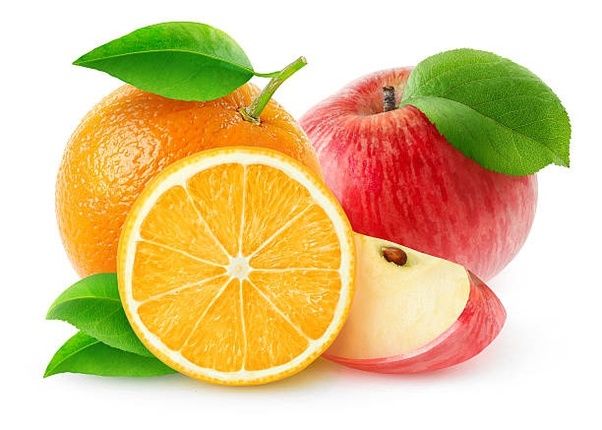When it comes to brain health, nutrition plays a crucial role. Both oranges and apples are packed with essential nutrients that benefit cognitive function, but which one is better for brain health?

Here, we’ll compare these two fruits to determine how each supports brain function and overall cognitive wellness.
Nutritional Overview of Oranges and Apples
Before diving into their specific brain health benefits, let’s take a look at the nutritional profiles of both fruits.
Oranges (1 medium-sized orange, ~130g):
- Calories: 62
- Vitamin C: 116% of the recommended daily value (RDV)
- Fiber: 3.1 grams
- Folate: 10% of the RDV
- Potassium: 5% of the RDV
Apples (1 medium-sized apple, ~182g):
- Calories: 95
- Vitamin C: 14% of the RDV
- Fiber: 4.4 grams
- Potassium: 6% of the RDV
- Phytonutrients: Quercetin, catechins, and flavonoids
Both fruits are low in calories, rich in fiber, and contain vitamins and minerals that contribute to overall health. However, their impact on brain health may differ based on their specific nutrients and antioxidants.
Oranges for Brain Health
1. High in Vitamin C for Cognitive Function
Oranges are renowned for their high vitamin C content, which is critical for brain health. Vitamin C acts as a powerful antioxidant that protects the brain from oxidative stress and inflammation, both of which are linked to neurodegenerative diseases like Alzheimer’s and dementia.
A study published in Frontiers in Aging Neuroscience showed that higher vitamin C levels are associated with better memory and cognitive performance (Travica et al., 2017). Regular consumption of oranges may help support cognitive function and reduce the risk of cognitive decline as we age.
2. Folate Supports Neurodevelopment
Oranges are also a good source of folate (vitamin B9), which is essential for brain development and function. Folate aids in the production of neurotransmitters like serotonin and dopamine, which regulate mood and cognition. A deficiency in folate has been linked to mental fatigue, poor concentration, and memory loss.
According to research published in The Journal of Nutrition, adequate folate intake is important for preventing cognitive impairment, especially in older adults (Morris et al., 2003).
3. Protects Against Stroke
The high potassium content in oranges also supports brain health by helping regulate blood pressure. Lowering blood pressure reduces the risk of stroke, which can cause long-term damage to the brain. Research from the American Heart Association shows that consuming more potassium-rich foods, like oranges, can significantly lower the risk of stroke (Strazzullo et al., 2011).
Apples for Brain Health
1. Rich in Antioxidants to Combat Cognitive Decline
Apples contain a variety of phytonutrients, including quercetin, flavonoids, and catechins, which are known to have neuroprotective effects. These antioxidants help protect brain cells from damage caused by free radicals, reducing the risk of neurodegenerative diseases.
A study in Experimental Biology and Medicine found that quercetin, a key antioxidant in apples, can protect neurons from oxidative stress, which may help prevent memory loss and cognitive decline (Spencer et al., 2012). This makes apples a valuable fruit for long-term brain health.
2. Improves Neurotransmitter Function
Apples are rich in flavonoids, which have been linked to improved brain function. Flavonoids help stimulate the production of acetylcholine, a neurotransmitter that plays a key role in memory and learning. A decline in acetylcholine levels is commonly seen in Alzheimer’s disease, so consuming apples regularly may help maintain healthy brain function.
Research published in the Journal of Alzheimer’s Disease suggests that flavonoid-rich foods, such as apples, are associated with a reduced risk of cognitive decline in older adults (Devore et al., 2012).
3. Supports Gut-Brain Axis
Emerging research highlights the connection between gut health and brain function, known as the gut-brain axis. Apples are an excellent source of dietary fiber, which promotes healthy gut bacteria. A healthy gut microbiome is linked to better mental health, mood regulation, and cognitive function.
A study published in Nutrients suggests that improving gut health through dietary fiber may positively affect brain health and reduce the risk of neuroinflammation (Dalile et al., 2019). Eating apples, which are rich in both soluble and insoluble fiber, can contribute to a healthy gut-brain connection.
Oranges vs. Apples: Which Is Better for Brain Health?
Both oranges and apples offer significant brain health benefits, but they work in different ways. Here’s a summary of how each fruit contributes to cognitive function:
- Oranges: High in vitamin C, folate, and potassium, oranges are excellent for protecting the brain from oxidative stress, supporting neurotransmitter production, and reducing the risk of stroke.
- Apples: Rich in antioxidants like quercetin and flavonoids, apples offer protection against cognitive decline and improve acetylcholine levels, which are essential for memory and learning.
So, which fruit is better for brain health? The answer depends on what you’re looking for:
- Oranges are ideal for boosting antioxidant protection, supporting brain development, and maintaining healthy blood pressure, which can reduce the risk of stroke.
- Apples excel in promoting long-term cognitive function, supporting neurotransmitter health, and enhancing the gut-brain axis.
Conclusion
Both oranges and apples are excellent choices for promoting brain health, each offering unique benefits. Oranges provide a rich source of vitamin C, folate, and potassium, making them particularly useful for cognitive protection and reducing the risk of stroke. Apples, on the other hand, are rich in antioxidants and flavonoids that support memory, learning, and overall brain function.
For optimal brain health, including both fruits in your diet is a smart strategy. They complement each other well, offering a diverse range of nutrients that support different aspects of cognitive function. Whether you choose to snack on apples or oranges, both can play a vital role in keeping your brain healthy and sharp.





